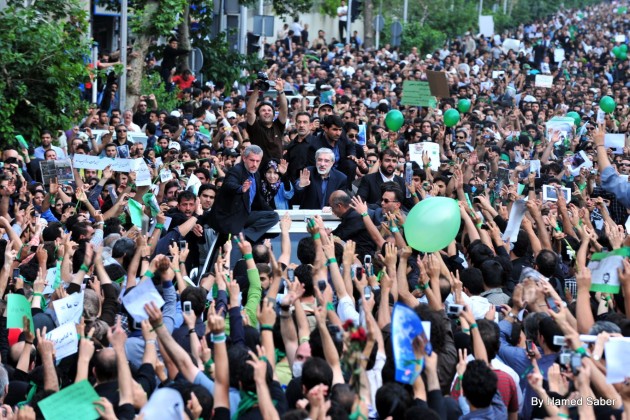Officals and Clerics Verbally Attack and Threaten 2009 Protestors and Leaders

In June 2009, Zahra Rahnavard and Mir Hossein Mousavi (pictured) participated in protests against the disputed results of the presidential election.
Addressing a gathering of IRGC commanders in the Northern City of Sari today, the head of Iran’s state broadcasting system, IRIB, criticized international questions about Iran’s arresting and imprisoning political activists, saying, “Those arrested in the 2009 events are not political prisoners, and because they intended to overthrow the regime, they are considered security prisoners.” He added, “The regime must seriously confront the ‘Heads of Sedition'”—sedition is a term used by government officials to refer to the 2009 protests—”and to stop tolerating them.”
Ahmad Jannati, Secretary of the Islamic Republic’s Guardian Council, who has had a bold presence in the events of the disputed 2009 presidential election, and who, ahead of the house arrests of the two presidential candidates, had demanded their house arrest publicly, spoke at a gathering of Guardian Council election monitors in Rasht today, issuing further attacks and accusations against the 2009 protesters, Mousavi, and Karroubi. “The imprisoned seditionists have committed crimes thousands of times bigger than armed robbers and rapists,” he said about a large group of Iranian student, social, civil society, and human rights activists, journalists, and other people who had come to the streets to protest the disputed election results. “The seditionists danced on the streets on Ashura [the holy day of mourning for Imam Hossein],” he said, adding, “The ‘ِDeath to America’ slogan includes individuals such as the heads of the sedition, who are attacked to America.” Jannati went on to assert, “no rational human being would accept that there was fraud in the election.”
Last week a hardliner cleric, Ghasem Ravanbakhsh, a student of the ultra-conservative Mohammad Taghi Mesbah Yazdi, told Solh News, “The betrayals Mousavi and Karroubi committed against the regime and the country were unprecedented during the entire Islamic Revolution.” He added, “The verdict of the heads of sedition is mohareb (enemy of God), and they should have been executed. I am personally prepared to put the noose around the necks of Mousavi and Karroubi.”
There have been numerous other state officials and top clerics who have been active in the recent, orchestrated attacks on the protesters and the opposition leaders under house arrest. Mojtaba Zolnoor, the Supreme Leader’s representative in the IRGC, has alleged that the protesters had been serving free alcohol in their street stands during the religious mourning day of Ashura, after which they have attacked the mourners.
In his open letter to President Hassan Rouhani, published on his Facebook page today, Sadegh Zibakalam, an outspoken Professor of Sociology at Tehran University, criticized the Iranian president for his joining in the chorus of state officials to congratulate themselves on the anniversary of a state-sponsored gathering following the violent crackdown on the 2009 public protests. Zibakalam asserts that though the hardliners have surely found Rouhani’s statements “smooth and desirable,” they disappointed many people who voted for him. “The hardliners, who have held all the state tribunes, have accused the protesters of the 2009 elections day and night and nonstop of any accusation, crime, allegation, and slander they could conjure. They have remained the only voice themselves, without giving the protesters a chance, even once, to tell their side of the story.” Zibakalam has asked Hassan Rouhani to express his opinion as “a lawyer” [one of Rouhani’s election slogans was “I am a lawyer, I am not a colonel”] regarding the three years of illegal house arrest of Zahra Rahnavard, Mir Hossein Mousavi, and Mehdi Karroubi, concluding that “if people had believed the propaganda tsunami of the past 4 years against ‘sedition’ and ‘seditionists,’ would Saeed Jalili [the conservative candidate] have received 4 million votes and Dr. Hassan Rouhani nearly 19 million votes?”
Mir Hossein Mousavi, former Prime Minister, and Mehdi Karroubi, former Speaker of Iran’s Parliament, had been presidential candidates in the 2009 election in which the incumbent President Mahmoud Ahmadinejad was declared the winner, under disputed circumstances. The announcement of his victory set off huge protests in Tehran and other cities, which the authorities violently suppressed, followed by arrests and show trials of journalists, government critics, and opposition activists linked to the campaigns of Mousavi and Karroubi. After the election, authorities tightly monitored and controlled the movements of Karroubi, Mousavi, and their wives, and suspended the presidential candidates’ newspapers Etemad-e Melli and Kalameyeh Sabz. In mid-February 2011, in the wake of their joint appeal for Iranians to demonstrate in support of pro-reform protests in Egypt and Tunisia, the men and their wives were placed under house arrest without court orders.
The International Campaign for Human Rights in Iran has repeatedly asked the Iranian Government to end the arbitrary house arrest of Mir Hossein Mousavi, Mehdi Karroubi, and Zahra Rahnavard, and to obey Iranian and International laws that offer all individuals access to due process.






